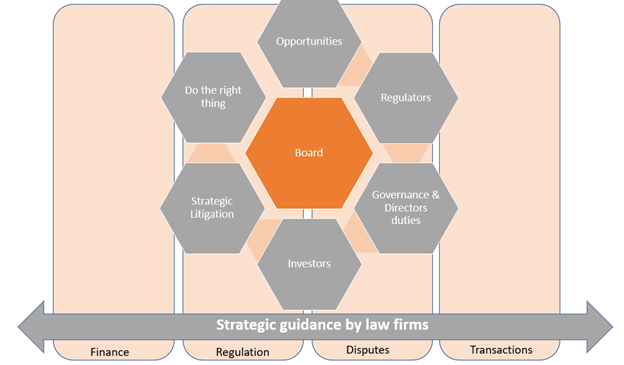As ESG begins to carry more weight with clients, their outside law firms should use this opportunity to expand their ability to advise and execute on clients' ESG initiatives
The rise of environmental, social & governance (ESG) amid converging crises is spurring the need for law firms to use more effective legal foresight by way of contextual and detailed scenario-planning and transformation governance, according to an online, cross-regional gathering of law firm leaders and legal futurists that was hosted by Inside Practice.
One consistently reinforced message from the group involves the interconnectedness of the ever-increasing pain our collective human decisions are putting on the planet and the continued degradation of nature’s ecosystems, which in turn is worsening the negative multiplier effects on the most vulnerable communities around the world. Indeed, the climate crisis is leading to irrevocable harm to the air we breathe, our food supply, and our habitable land, all of which instigates human migration patterns, geopolitical conflicts, and increased spending on reactions to the crises instead of proactive prevention.
The connection between these converging crises and the rise of investor institutional interest in ESG — including around climate transition risk — is clear. “Firms with trillions under management have become too big to let the planet fail,” stated a 2019 Harvard Business Review article. Yet, at the same time, the standing power of the hope and commitment of legal and justice strategists, leaders, and futurists is a fundamental element that’s needed to support the ambitions for positive actions now and in the future.
The legal community plays a pivotal role in the outcome and in transformational governance, a concept defined by the United National Global Compact. For “business to be more accountable, ethical, inclusive, and transparent to drive responsible business conduct, improve ESG performance, and strengthen public institutions, laws, and systems. This means fostering a culture of integrity, fairness, and inclusion beyond legal formality — asking not just what is legal, but what is right,” the Compact states. Indeed, it underpins the UN Sustainable Development Goal 16: Peace, Justice, and Strong Institutions.
Pushing for the need for transformational governance
Law firms’ commitments to their own internal ESG strategies and their own guidance and advice to companies are critical ingredients for transformational governance. For example, Timothy Wilkins, global partner for client sustainability at Freshfields, describes how his firm looks at the role of its lawyers in its holistic ESG strategy. Actions the firm urges lawyers to consider include:
-
-
- Working responsibly within the firm’s internal operations — seeking net zero and environmental targets, diversity, equity & inclusion (DEI) objectives, and sustainable procurement practices
- Collaborating for impact — joining leading climate change and DEI initiatives and collaborations with governments on responsible business policy
- Offering strategic advice and thought leadership — advancing ESG agendas and supporting the transition of business and finance to these goals
-
In providing strategic guidance to clients, law firms have a central role to play in legal foresight through issue-spotting and horizon-scanning across the four common areas of strategy on which law firms often advise on ESG-related matters: finance, regulation, disputes, and transactions (See Figure 1). In addition, firms’ guidance cuts across a number of corporate clients ESG concerns, opportunities. and issues.

Moreover, investors have been up front about asking for additional information on ESG while receiving many shareholder proposals around many ESG issues, such as those involving executive compensation and climate risk, says Wilkins. In addition, emerging risks continue to show up in the form of strategic litigation from investors and non-governmental organizations (NGOs) that are concerned about pushing a particular issue.
Law firms positioned to play a key role
In fact, the collective experience of providing strategic legal guidance across government, private sector clients, and other public sector institutions covering multiple matters and practice areas — including antitrust, labor & employment, litigation, tax, M&A due diligence, sustainable finance, corporate governance, shareholder activism, and regulatory and compliance disclosure and reporting — leaves firms positioned well to convene multilateral stakeholders to influence transformational governance.
For example, Freshfields was a founding partner among financial institutions, academic institutions, and consumer companies to launch the New York Circular City Initiative in order to drive positive impact and help create an economic system based on the re-use and re-generation of materials or products, especially as a means of continuing production in a sustainable or environmentally friendly way, often referred to as a circular economy. Indeed, 78% of the world’s energy is consumed in cities, particularly in the Global South; and those firm that can strengthened relationships with those clients can make a more positive impact.
The planet, the human race, food systems, and habitats are on the verge of irreversible harm. Whether or not we, as humans, and the instigators of most of the harm meet the moment is yet to be seen. In the meantime, the legal community and especially law firms around the world have the ability and opportunity to lead from a position of strength, now more so than ever in the last 50 years.







